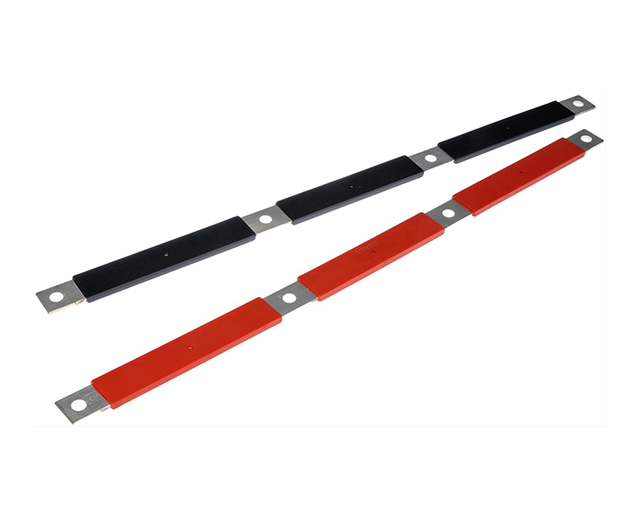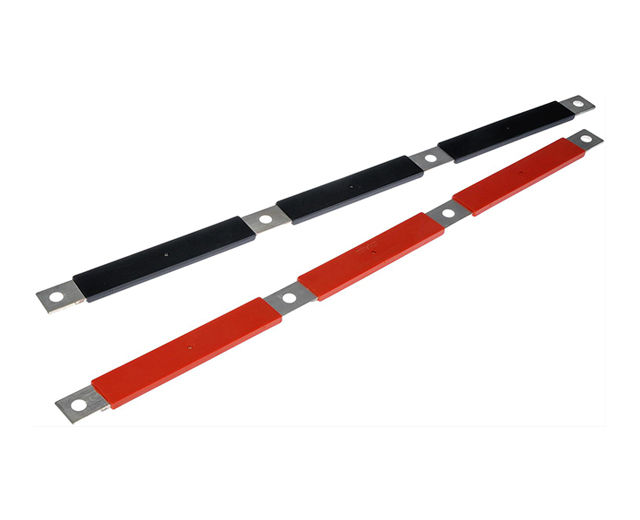

A Battery Cable Busbar is an essential conductive component designed to connect battery terminals safely and efficiently within battery packs and power distribution systems. Manufactured using high-conductivity copper, these busbars ensure optimal current flow with minimal resistance and heat generation. They are available in multiple configurations such as Copper Battery Cable Busbar and Flexible Battery Busbar, meeting the demands of modern energy systems, from electric vehicles (EVs) to energy storage solutions.
A Battery Busbar is a precision-engineered electrical connector that links battery cells, modules, or terminals together. Unlike standard wires, Battery Copper Busbars provide a rigid, low-resistance path for high current flow, ensuring efficiency and safety in high-power applications. They can be insulated with PVC, heat-shrink tubing, or silicone jackets for additional protection against short circuits and environmental factors.

The production of Battery Cable Busbars involves advanced manufacturing techniques to guarantee precision and durability:
Material Selection: Premium tinned copper or oxygen-free copper is chosen to form Copper Battery Cable Busbars, ensuring excellent conductivity.
Cutting and Forming: CNC cutting and bending create precise shapes, including straight bars or flexible battery busbar designs for compact spaces.
Drilling & Punching: Holes and terminals are added for seamless battery cable connector attachment.
Surface Treatment: Tin plating or nickel plating improves corrosion resistance and longevity.
Insulation Application: PVC sleeves, heat shrink tubing, or silicone insulation are applied according to voltage and environment needs.
Quality Inspection: Each battery busbar connector undergoes strict testing for conductivity, mechanical strength, and insulation integrity to meet UL, RoHS, and REACH requirements.
High Electrical Conductivity: Using copper ensures extremely low resistance for efficient power transmission.
Durable Insulation: Protective layers resist heat, moisture, and mechanical stress, ensuring long service life.
Precision CNC Machining: Guarantees perfect alignment for battery busbar connectors and cable lugs.
Excellent Corrosion Resistance: Tin plating prevents oxidation and ensures consistent performance.
Flexible Options: Availability of flexible battery busbar designs allows for easier installation in compact or vibration-prone areas.
Customizable: Dimensions, hole patterns, and insulation types can be fully customized for your battery pack or power system.
Battery Cable Busbars are widely used across multiple industries where efficient and safe power distribution is critical:
EV Battery Packs: Reliable battery busbars connect cells and modules to manage high current loads in electric vehicles.
Energy Storage Systems (ESS): Maintain stable current flow in solar, wind, and hybrid energy storage applications.
Industrial Battery Banks: Powering forklifts, backup systems, and heavy-duty machinery.
Power Distribution Units (PDU): Battery copper busbars ensure safe routing of electricity in control cabinets.
Telecom & UPS Systems: Provide stable backup power and reduce downtime in critical applications.
When designing or selecting a battery cable busbar, consider:
Current Carrying Capacity: Determine copper thickness and cross-sectional area to handle required amperage safely.
Hole & Connector Design: Ensure proper spacing and shape for battery cable connectors and lugs.
Insulation Requirements: Choose suitable insulation based on voltage, temperature, and fire-retardancy needs.
Flexibility Needs: For tight installations, a flexible battery busbar is recommended to accommodate movement and vibration.
Surface Finish: Tin or nickel plating to improve corrosion resistance in harsh environments.
Our team offers full customization for battery cable busbars, including:
Custom lengths, widths, and thicknesses.
Multiple hole sizes and battery busbar connector configurations.
Flexible and rigid busbar designs.
Surface finishes such as tin, nickel, or silver plating.
Prototyping services for new battery pack designs.
G and N Fortune Limited is your trusted partner for battery cable busbars thanks to:
Over 15 years of experience manufacturing high-quality copper busbars
Strict adherence to UL, RoHS, and REACH certification standards
Advanced CNC machining and welding equipment for precise production
Ability to handle large-scale orders and fast turnaround times
Dedicated engineering support for custom design and prototyping
Competitive pricing and reliable global shipping
We use high-conductivity tinned copper, oxygen-free copper, or copper alloys. Insulation options include PVC, heat shrink tubing, and silicone to meet various temperature and safety requirements.
Main applications include EV battery packs, energy storage systems (ESS), industrial battery banks, power distribution units (PDU), and telecommunications backup systems.
Yes. We offer full customization on length, thickness, hole size, terminal shapes, and insulation type based on your design drawings or requirements.
Depending on design and copper thickness, current ratings can range from 100A to 2000A or more. We assist in selecting the right size for your application.
Yes, our products comply with RoHS, UL, and REACH standards. Certificates are available upon request.
Prototypes: 5–7 business days
Bulk orders: 10–15 business days, depending on quantity and complexity
Ensure correct alignment of holes and terminals, avoid sharp bends beyond the recommended radius, and apply proper torque on connectors. Installation guides are available.